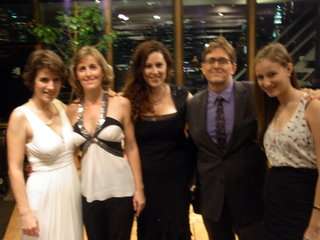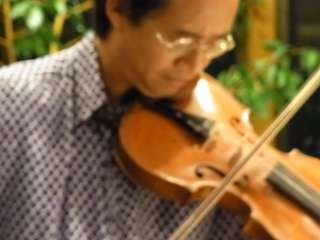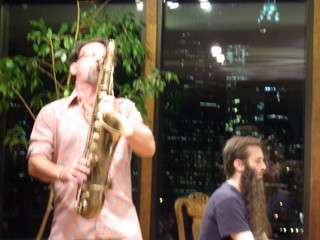|
Back
The Easy Labors of Labor Day Weekend New York
BargeMusic, Fulton Ferry Landing, Brooklyn
09/02/2010 - & September 3, 4, 5, 2010
The “Here and Now” Series
James Nyoraku Schlefer: Brooklyn Sanya for solo shakuhachi – Duo No. 3 for shakuhachi and 20-string koto
Justin Dello Joio: Piano Trio “The March of Folly”
Scott Wheeler: Selection from Portraits and Tributes: Crowley Meditation; Cookie Galop with Waltz (World Premiere) – Sketching
Iannis Xenakis: Mikka “S”
Elizabeth Adams: Blurry Edges, Shiny Middles (Commissioned by BargeMusic–World Premiere)
Tom Chiu: BABIP (balls in play)
Ben Johnston: Duo for two violins
Adam B. Silverman: I love my love with a v
Jeff Lederer: Sunwatcher – Balls of Simplicity – Hungarian Rock
Yumi Kurosawa (Koto), Tom Chiu, Conrad Harris (Violins), Trio Vela: Asmira Woodward-Page (Violin), Amy Barston (Cello), Olga Vinokur (Piano) – Jeff Lederer’s “Sunwatcher” Quartet: Jeff Lederer (Saxophones/Clarinet), Jamie Saft, (Piano), Chris Lightcap (Bass) Allison Miller (Drums)

A. Woodward-Page, O. Vinokur, A. S. Barston, J. and C. Dello Joio
(© Herring Rollmop)
BargeMusic is making them work this weekend. Over a dozen chamber players, playing two-and-a-half-hours’ worth. Last night, tonight, tomorrow night and Sunday afternoon. A few world premieres, a few rare instruments, and three entirely different genres.
All of this with the background of the East River, Manhattan and the threat of a hurricane which might come roaring in, toppling over the rare 20-string koto, a massive drum set, and the intensity of the musicians involved.
More than concert, though, the “Here and Now” series started with a musical mantra, a Zen ritualistic solo slowly coming from behind the concert hall up to the stage, and finishing with some breathy pyrotechnics by James Nyoraku Schlefer, the American master of the shakuhachi, the Japanese flute.
Like Japanese restaurant live crab, the shakuhachiis an acquired taste. Few “pure” Rampal-Galway notes come through. Rather, one must orient oneself to breaths, whispery notes, almost impossible glissandi, and notes which seem to blend in with the atmosphere, rather than playing against it.
But accustomizing oneself is not difficult, not with Mr. Schlefer’s apparent utter mastery of the instrument. And it became downright simple with his Third Duo played with master koto-player Yumi Kurosawa. The 20-string koto, sounding like a zither on steroids, was in a playful mood for this amiable piece. It was a conservative work in three attached movements, mischievous, tuneful, with little hints at jazziness, a few semi-exotic melodies., and the kind of music which was both comforting and delightfully composed.
Actually the entire first half was filled with music that could have been written in the 1950’s by part of the Copland/Harris/Diamond/Dello Joio stable of Establishment composers. Which brings up the other Dello Joio, Norman’s son Justin, whose piano trio, had the pinprick intensity, sarcasm, the acerbic measures that could have been written by Prokofiev in his earliest years.
I always liked his father’s music, but don’t remember anything so wickedly malicious as its subtitle “The March of Folly.” The Trio Vela, three young women, thrust their musical daggers into every phrase, ripping the notes in and out with absolute ferocity. The final movement a “Prayer for Chiara” (Mr. Dello Joio’s daughter, present here with her father), could have been a letdown. But Mr. Dello Joio has such unerring technique as composer that it seemed quite at home with the “follies” of the first three movements.
That first half, with pleasant piano and cello works by Adam Silverman and Scott Wheeler, was the conservative American side of the program. After the intermission, the emotions changed dramatically.

T. Chiu (© Herring Rollmop)
Most of the change was due to BargeMusic regular Tom Chiu. Though Mr. Chiu and his demoniacal fiddle is a regular performer wherever composers need something impossible to be made possible.
In this case he premiered an “impossible” solo violin work by Elizabeth Adams, commissioned by BargeMusic, entitled, for reasons I can’t figger out, Blurry Edges, Shiny Middles. One could only marvel at Mr. Chiu using every violin trick in the book to make sounds harsh and sweet, sending four strings up and down the scale, creating sounds which no violin should be allowed to perform.
It was flaunting, flashing and heavy-laden with trapeze-artist gimmicks. After that, Mr. Chiu’s own solo BABIP, starting with three minutes of pizzicato, and ending with variations on the same (including a foot-stamp or two) was easy listening.
The other violinist, Conrad Harris, was equally showy in a more substantial short piece by Xenakis. Physically Mr. Harris was one player, but had I heard this on recording, I would have wondered where the second violinist was. A series of double-stop glissandos, with different scales, different lines, alternating energies and stases, this was not a circus act, but a work of inspired wonder. And just when you thought he couldn’t do anything more, Mr. Chandler ended with these sliding tones interrupted by highly rhythmical bowing attacks.
Whew! That could be the only reaction to a work both structurally and technically wondrous.

J. Lederer, J. Saft (© Herring Rollmop)
The third section was with Jeff Lederer’s “Sunwatcher” Quartet playing four pieces, which were not (heaven help this phrase) “jazzed up” but given the intensity and energy which would have amazed the original composers.
The work inspired by Artie Shaw started with a big band rhythm, but got into metaphysical variations (including Mr. Lederer literally undressing his clarinet of its respective tubes) A work based on Morton Feldman did have the latter’s base of slow slow music, but the spaces were as intense as the musicians, mainly drummer Allison Miller, who knew where to fill in the spaces, where to keep us on the edge, wondering what the hell she would do next.
Hungarian Rock was based on Ligeti, but there was little Ligeti to behold. Still, the Hungarian master, who embraced every kind of music, would have been fascinated by this four-person vigor, strength and velocity. Next to them, our oncoming hurricane would seem, at its most violent, like a measly drizzle.
Harry Rolnick
|